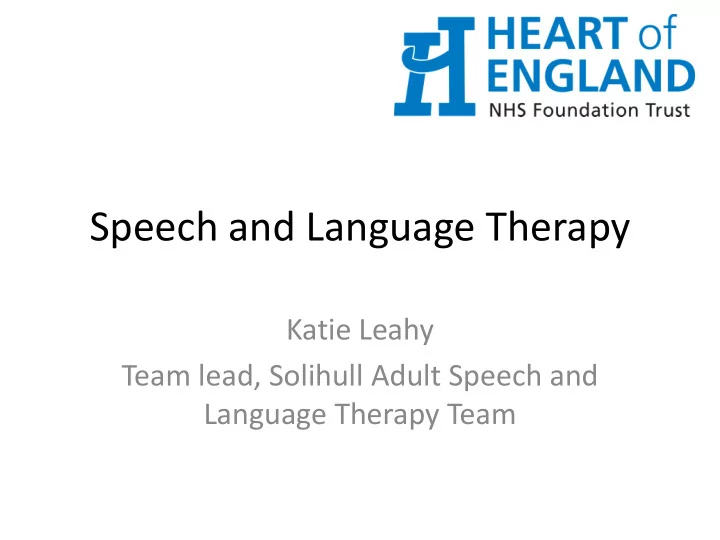

Speech and Language Therapy Katie Leahy Team lead, Solihull Adult Speech and Language Therapy Team
Who are we? • One team covering both acute, enhanced supported discharge (ESD), and community service • Part of the wider HEFT Speech and Language Therapy team • Based on ward 10, Solihull Hospital (for now!) • Acute & ESD 1.8 WTE, community 1.5 WTE
Who do we see? • Any person over 18 who has an acquired difficulty in communication, voice or swallowing • Adults with learning disabilities are not seen by our team
Referring to Speech and Language Therapy • Anyone can refer to SLT • Accept written referrals via fax or post, or phone referrals • Vital to know medical history, including prognosis • All non voice referrals are triaged via telephone • Urgent - 2 weeks, Routine- 8 weeks
Voice • Voice concerns/globus/pain on swallowing must be investigated by ENT • Close links with voice clinics at Heartlands • Offer advice and therapy to improve voice problems
Communication Assessment and management of difficulties in expression and /or comprehension Motor speech disorders Dysarthria- muscle weakness resulting in unclear speech Dyspraxia- Difficulties in planning movements for speech Language disorders Aphasia- difficulties in the understanding or expression of language
Dysphagia • DYS (difficulty) and PHAGIA (to eat) • Any difficulty in the chewing and/or swallowing of food, fluids and saliva • Any point between putting food/fluids into the mouth and these entering the stomach • SLT work with oro-pharyngeal dysphagia- establish level of dysphagia, and risk of aspiration
Possible signs of an oro-pharyngeal dysphagia • Coughing/choking • ‘Gurgly’/wet voice or breathing • Change in breathing • Eyes watering • Change in face colour • Pouching/pooling • Recurrent chest infections • Weight loss/malnutrition • Spiking temperatures • Slow to eat
How do we assess? • Full case history and discussion around difficulties • Cranial nerve assessment • Swallow assessment
What do we do about it?
Thickener isn’t always the answer!
Types of thickener Gum based Starch based
Diet modification • Normal diet • Mashable diet • Pre mashed diet • Puree diet
Feeding at risk • Identified risk of aspiration on oral intake which may be reduced, but not eliminated by strategies/modification • Consideration of treatment options
What do we do about it? Dysphagia is an important risk factor for aspiration pneumonia, it’s “generally not sufficient to cause pneumonia unless other risk factors are present as well” Langmore et al (1998) Predictors of aspiration pneumonia: how important is dysphagia?
Recommend
More recommend